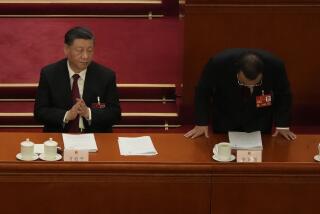China’s Hu: a Short March to the Top
- Share via
PEKING — Five years ago, when Hu Qili became mayor of Tianjin, China’s fourth-largest city, he broke new ground simply by holding occasional press conferences to answer questions about urban affairs.
Last week, Hu, 56, made the biggest jump yet in his meteoric rise within the Communist Party. He landed a seat on the party’s 22-man Politburo while, at the same time, maintaining his job as head of the Secretariat, which runs the party’s day-to-day affairs.
China’s top leader Deng Xiaoping is so clearly grooming the relatively young Hu to take control of the world’s most populous nation that one Western European analyst here has dubbed Hu “the Chinese Gorbachev”--comparing Hu to Mikhail S. Gorbachev, who became Soviet party leader last March at the age of 54.
“Deng wants someone in place who can run the country for another two decades after his death,” this diplomat said. “Hu Qili is the guy.”
The comparison between Hu and Gorbachev goes beyond age. Like the Soviet leader, Hu is a smooth, sophisticated party leader, fluent in English and familiar with the ways of the West. Like Gorbachev, he has a knack for public relations.
Predictions of smooth political succession are always hazardous in China, where the death of an emperor or a political leader has often been followed by intrigue and upheaval.
If Deng were to die or step aside as China’s top leader, Hu might well be blocked from taking over by forces within the Communist Party, the army and bureaucracy who have opposed Deng’s economic reform policies.
Yet analysts here have been surprised at how rapidly Hu has advanced during the last year.
Last fall, Deng, 81, made it a point to tell party officials and foreign visitors that his top two aides, party General Secretary Hu Yaobang and Premier Zhao Ziyang, were prepared to take over for him.
Now, Hu Yaobang, 69, and Zhao, 65, are portrayed merely as transitional figures, not those who will lead China in their own right. When Deng met with Singapore Prime Minister Lee Kuan Yew this month, he introduced the visitor to Hu Qili.
Hu Qili (pronounced Hoo Chee Lee) was born in Shaanxi province in central China in 1929 and was barely 20 years old at the time of the Communist victory in China’s civil war.
He joined the Communist Party in 1948 while he was studying mechanical engineering at Peking University, one of China’s most prestigious educational institutions. He remained active in Communist Youth League affairs throughout the 1950s and early 1960s, and traveled with student and youth delegations to North Korea, Cuba and Africa.
It was apparently during this period that he became acquainted with his political mentor, Hu Yaobang (no relation), who served as first secretary of the Communist Youth League in the late 1950s and is now Deng’s highest-ranking aide.
Both Hu Qili and Deng were denounced as “capitalist roaders” and followers of Chinese President Liu Shao-chi during the Cultural Revolution. Hu was sent to the countryside and re-emerged as a local party official in the remote province of Ningxia.
After the death of Mao Tse-tung in 1976, Hu Qili returned to prominence in Peking, first as vice president of Qinghua University and then, at age 49, as secretary of the Communist Youth League, the job Hu Yaobang once held.
He became mayor of Tianjin in 1980, and in 1982 was given positions both on the party Central Committee and on the Secretariat, serving in effect as Hu Yaobang’s right-hand man.
Like Gorbachev, Hu Qili has a reputation for impatience with sloth and bureaucracy. Two years ago, in an article entitled “Old Ways Will No Longer Do,” he wrote that too many high-ranking cadres “are buried in a mountain of paper and float on a series of meetings.”
If there is no change in China’s political winds, Hu Qili is expected to take over as general secretary of the 40-million-member Chinese Communist Party two years from now, when Hu Yaobang has said he plans to retire.
More to Read
Sign up for Essential California
The most important California stories and recommendations in your inbox every morning.
You may occasionally receive promotional content from the Los Angeles Times.













